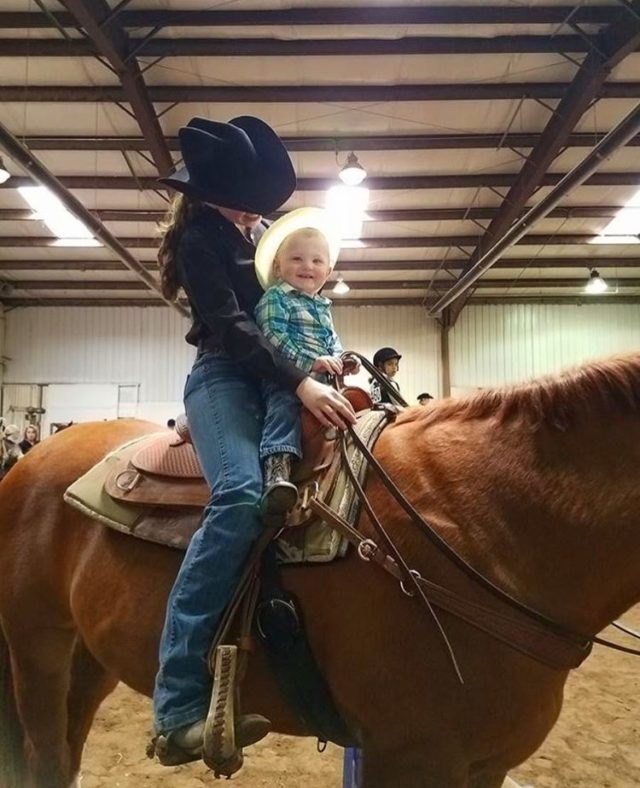
7 Reasons To Never Let Your Kids Grow Up to Be Cowboys
A tongue-in-cheek list.
“Mamas, don’t let your babies grow up to be cowboys,” sing Willie Nelson and Waylon Jennings in their classic country song. Despite this sage advice, thousands of parents continue to let their children pursue horses as a hobby or even a career. I am far from being a mother, but I do have a little cousin who, at a year and a half, already exhibits some symptoms of becoming a cowboy later in life. Listed below are seven reasons to never expose children to the plague of horses, both for their sake and your own.
1. Horses will forever impair your child’s sense of hygiene.
Once your child sets foot in a barn, they will quickly become used to the stench of animals and manure, an odor which will permeate their clothing and infect your house every time they come home. Even worse, they will be unaware that they smell, and may therefore prove disinclined to shower immediately after. Excuses such as “The barn smell is so comforting!” or “I don’t smell that bad!” are common.
In many cases, the child may even wear his or her barn clothes into the house, where they will shed dirt, hay, and horsehair everywhere. As they grow older, they will continue to embarrass you in increasingly public ways, such as picking up groceries in barn clothes or even showing up late to family events in manure-coated boots.
2. Riding encourages time outside, away from the comfort and safety of the home.
Once infected with the “horse bug,” children show an inclination to spend more time outdoors with horses or at the barn riding, doing chores or generally causing trouble. This removes them from the easily-monitored sphere of the home and encourages independence, thus taking away the convenience and control of helicopter parenting.
3. All horse shows are an unwholesome environment.
Although equestrians say that horse shows are a valuable learning experience that teach life skills like organization, time management, patience, budgeting, sportsmanship, and self-awareness, the reality is that horse shows are unwholesome. At all levels, they encourage unhealthy competition, pitting children and horses against each other. Inevitably, they will prove a negative experience for both you and your child, and both are likely to end the day with no money and in frustrated tears.
4. Working at a barn ruins any work ethic your child might have possessed.
Getting up at dawn to feed horses, pushing a wheelbarrow through a foot of snow and grooming a horse crusted with dried mud will dishearten your child, making them forever afraid of hard work. The idea that he or she must work towards a long-term goal in riding will make it difficult to focus and thus cause a disinterest in goal-setting and labor in general.
5. Horses encourage procrastination.
Refer back to #2: eventually, your child will prefer to be at the barn instead of at school or home. If the condition becomes severe, they may even miss several days of school each year to go to horse shows; for example, I myself, grievously afflicted with equestrianism, will soon miss the entirety of finals week for a horse show. Riding horses ruins all motivation to excel in school projects. Although Alfred University’s equestrian teams maintain the highest GPA of any other sports team at Alfred, this is likely only a result of careful cheating and bribery.
6. Riding is not exercise and will not improve one’s physical or mental condition.
Most equestrians are thoroughly out of shape, but they would never admit it. The “muscular legs” they claim are a lie, simply a result of fat re-distribution to the thighs due to the strain of maintaining such an unnatural straddling position. Riding clothes are specifically designed to make equestrians look more fit than they actually are — anyone could wear riding clothes and look athletic and posh. Likewise, all horse people are unapologetically crazy, an unavoidable symptom your child will soon fall victim to if allowed access to horses. There are probably tons of studies that say so, just look it up — horse people are poorly equipped to deal with stress and have no idea how to problem solve.
7. Learning to ride is a waste of time and will never prove worthwhile.
It’s a ridiculous notion that taming a dangerous, smelly animal by climbing onto its back is a worthwhile hobby; beyond being useless, riding is detrimental to children’s well-being. Everyone who has ever been involved in the horse industry can tell you that it has been overall a very harmful experience, and one they wish they had avoided at all costs. Any memories created while at the barn will surely need to be revisited later in life with a therapist, and any trophies or ribbons accumulated are simply a tangible reminder of the toxic environment at horse shows. The best thing to do with horses is to avoid them at all costs, and keep your children away from them. There is no worse fate for a child than to grow up and become an equestrian.
Haley Ruffner is attending Alfred University, majoring in English with minors in Business and Equestrian Studies. She owns a Quarter horse gelding At Last An Invitation, or “Cricket.” Haley is the captain of the AU western equestrian team, and also competes in reining and loves trail riding.









Leave a Comment